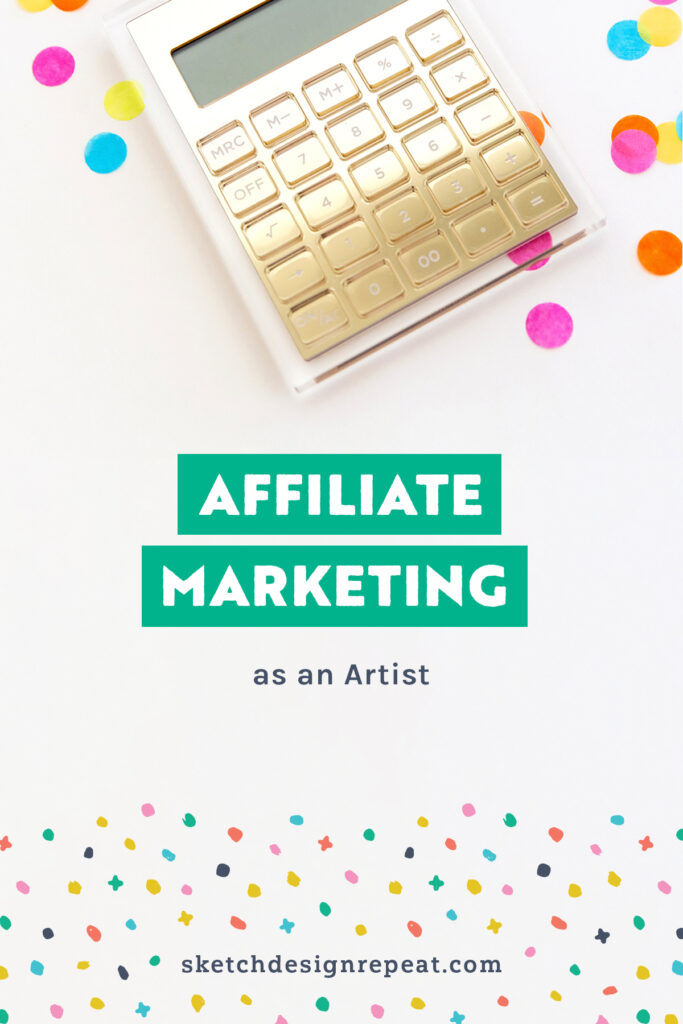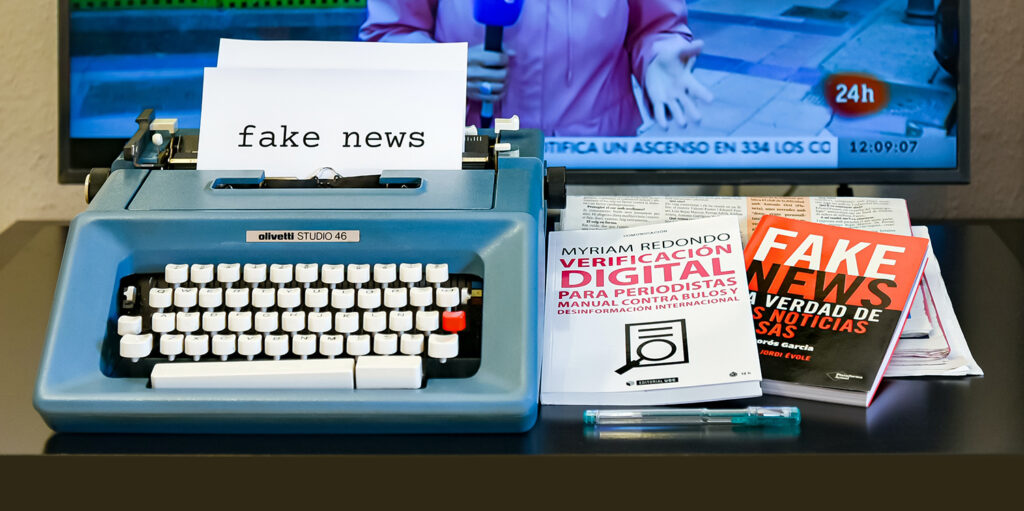Over the past year, I have seen a few discussions on social media about affiliate marketing for artists, and it’s clear that there are a wide variety of opinions and feelings about it. I also noticed a fair amount of misunderstanding about what affiliate marketing is and how it works.

So, I’ve dug a little deeper into the world of affiliate marketing to clear a few things up for everyone. Whether you love it or hate it, it’s always better to be well informed — and, you’ll be much better prepared for your next Facebook argument. Bonus!
In this blog post, I’ll cover …
- What is affiliate marketing?
- Busting 5 common affiliate marketing myths
- Affiliate marketing for artists
- Why affiliate marketing gets a bad rap
- How to do it right (and legally)
What is affiliate marketing?
In very simple terms, an affiliate marketer is an online sales rep for another business’s product. The business benefits by reaching a larger audience (the affiliate’s audience) and the affiliate, in turn, gets paid by that business, on commission for any sales that come via their marketing efforts.
Sales are tracked by an affiliate’s link (which will track everyone who clicks on it), or promo code that customers use at checkout. The affiliate doesn’t get involved with processing transactions or delivery of the product; once someone uses their link or code, their job is done and they get paid their commission.
Commissions are usually 5% – 30% of the purchase price, but they can be less or significantly more, depending on the product. Alternatively, it could be a flat fee per purchase.
There are three types of affiliate marketing:
- Involved — The affiliate personally recommends products they have used or experienced themselves.
- Related — The affiliate promotes products related to their industry, but they have not experienced them.
- Unattached — The affiliate has no connection to the product or service they promote.
Myth Busting!
There are a few myths floating around the internet about affiliate marketing, so let’s address five of the most common offenders.
- It’s a Scam — False
It’s a legitimate form of marketing and when done properly, benefits both the marketer and the affiliated business. Sometimes it also benefits the customer. That doesn’t mean there aren’t still some affiliate scams out there, but the vast majority aren’t.
- It’s an MLM or Pyramid Scheme — False
The requirement to recruit is what defines an MLM or pyramid scheme. Affiliate marketers do not recruit because that would create more competition. Some MLM companies refer to their recruits as “sales affiliates,” which might be the reason for some of the confusion.

- Products Are More Expensive — False
It’s logical to think that the affiliate fee must be built into the price of the product but affiliate marketing is more of a revenue-sharing model than an upfront marketing cost. Affiliate products should never be more expensive for the customer.
- It’s a Get Rich Quick Scheme — False
Not many people will instantly make good money with affiliate marketing, and most never do. If someone makes good money quickly, it’s because they have grown a large audience or following already. There’s nothing quick or easy about that, and it’s why online influencers within an industry are often invited to be affiliates.
- It’s Sleazy — False(ish)
Affiliate marketing in itself is not inherently unethical or sleazy, but the individual marketer might be using sleazy marketing practices.
Affiliate Marketing For Artists
The most usual type of affiliate marketing done by artists is the Involved type, where the affiliate makes personal recommendations to their audience. Commonly these are favorite products they’ve used and/or great classes they’ve taken. Promotions can be made via emails, blog posts, social media posts and stories, or anywhere else the affiliate connects online with their audience.
Favorite Products
Not surprisingly, the most popular affiliate program for art-related retail products, such as books, art materials, tools of the trade, etc., is Amazon. Amazon affiliates earn between 1% and 10% of the retail price, depending on the product. Whilst this isn’t much, it can add up to a good income if the affiliate has a high volume of traffic on their website. It’s also relatively easy to persuade people to purchase from Amazon because they are probably already familiar with the site, the products aren’t usually very expensive, and they can read other online reviews before purchasing.

If you are interested in becoming an Amazon affiliate, sign up for the Amazon Associate program. Make sure to read the small print before applying because rejected applications will not be eligible for reconsideration. Amazon has some very specific criteria for being accepted into its program.
Favorite Classes & Courses
Affiliate programs for online classes and courses are usually temporary because the affiliate link or promo code will only work during the class enrollment period. Many course creators offer affiliate opportunities to former students; sometimes to all former students, and sometimes only to a select few. Either way, the commission earned on class sales is usually between 10% – 50% or a flat fee.
High-priced courses that pay affiliates a high percentage of commission can be very lucrative. However, a high-priced class is harder to sell than a low-priced product, and there is normally only a small window of opportunity to make that sale. Sadly, this can sometimes lead to desperate sales tactics from a few affiliates.
Related Article: Marketing Yourself as a Surface Designer
Why Affiliate Marketing Gets A Bad Rap
It’s mostly due to a lack of trust, and sadly not without good reasons because the affiliate marketing model has some particular challenges in the trust department.
Financial Incentive
All affiliates have a financial incentive to recommend a product, which can lead people to question the integrity of their recommendations. Some people will actively avoid using affiliate links even when they intend to buy the product because they mistrust the practice so much.
Very Large Commissions
Some high-ticket products with high commission percentages, such as online classes, can earn an affiliate $1,000 or more per sale. That’s a huge incentive to recommend a class, and it’s no coincidence that these higher-priced courses often have the most aggressive affiliates. Affiliates are not required to declare their commission rate, but many rates can be found with a quick Google search.
Manipulative Marketing
Sadly, some affiliate marketers are happy to embrace manipulative marketing tactics, which gives everyone a bad name. Thankfully people are becoming wise to these tactics thanks to a few marketing experts who are speaking out. The podcast Duped: The Dark Side Of Online Business explains what’s so wrong with many of them.
Misleading
Affiliates can legally promote products and classes that they haven’t experienced. Some will strongly recommend a class as if it led to their success when in reality, they didn’t take it. This is unfair, especially if the affiliate is a successful influencer that people might want to emulate.
Too Good To Be True
Some online course creators with hundreds of affiliates (e.g. Marie Forleo and Tony Robbins) require all students to sign a non-disparagement clause before getting access. This legally bars students from ever saying anything negative about the class and their experience, so all reviews will be positive. This makes it extremely hard for people to research the true value of the class and whom it might suit best.
Too Many Affiliates
When a high-commission class has hundreds of affiliates (or even a few too many within the same community), people can get bombarded with promotions from all directions during the pre-enrollment and enrollment period. This can become super annoying because people feel badgered, and nobody likes that.
Hidden Disclaimers
Because financial incentives do so often influence reviews, the customer needs to know that the review might be biased. If something looks like a genuine recommendation from someone you respect, then way down in the teeny tiny small print, you spot the affiliate disclaimer (which they were hoping you wouldn’t notice), people feel like they’re being conned.
Shannon’s Thoughts on Affiliate Marketing
I thought it’d be helpful to interject my own thoughts into this post as I’ve been on both sides of affiliate marketing. And truthfully, I was a bit hesitant when Bex submitted this idea for the SDR blog because she’s right — affiliate marketing often gets a bad rap — and I’ve known fellow artists and course creators who’ve been verbally attacked on the subject.
But that’s precisely WHY this post is so important and it’s why I invited Bex to write it! Because she’s right: affiliate marketing doesn’t have to feel sleazy or be coercive.
From my experience being an affiliate, integrity is THE most important thing. That’s why:
- I only ever promote products, books, and tools that I’ve used personally and found valuable — btw, you can find those on our Resources page.
- I’ve only affiliated for two other course creators instead of all the ones that have asked.
- I stopped affiliating with Amazon in 2020 (because of their racist practices and unsafe work conditions) even though it brought in fairly passive income for me.
And on the flip side as someone who also has affiliates for our courses, the same holds true: honesty and transparency are what’s important. That’s why:
- The only people I allow to affiliate for me are past course students and a select group of fellow veteran artists. As for the veterans, they’re usually involved in some way, like my artist interviews in Artful Pricing, and they’re also given free access to the entire course so they can watch the content and affiliate for the programs honestly.
- I support all my affiliates with an Airtable base that includes common FAQs, a promotion calendar, and images and graphics they can leverage. Jena and I are also available for troubleshooting issues, as I value every affiliate I have and the time and effort they put into promoting my courses.
- I host live chats with new affiliates to and walk through the technical side of how my program works, give them tips on how to promote a course in an honest and transparent way, and included multiple reminders about the importance of disclosure (which Bex talks about below).
Finally, offering an affiliate program also allows me to support my students financially: it gives them an opportunity to make back the investment they made with me and a few have even turned a profit — making back more than what they initially paid for a class.
And as Bex mentioned above in the myth busting section, I don’t base the price of the course on what I’m paying my affiliates. Instead, the price is based on the value that class offers.
Because the way I see it, the new students I receive may not have signed up for the course without hearing about it from my affiliates first. So instead of paying an affiliate thinking it’s money I’m losing, I always think about the income I gained because they enjoyed my course so much that they wanted to help me promote it.
Well, I hope it helped hearing a second perspective because I believe that affiliate marketing can be a great way to add to your income… as long as you do it authentically!
The Right Way To Do Affiliate Marketing
Know The Law
By law, there must be clear affiliate disclosure close to every affiliate link (including on every social media post). Most countries in the Western world, and many others, have similar laws.
Affiliate disclosure law in the USA is clearly described in This Guide.
Choose Carefully
Only be affiliated with people, products, and businesses that you truly trust, respect, and believe in, because your reputation is now linked with theirs and their product.
Know The Product
Affiliate marketing is much more successful when an honest review or recommendation is written by someone who truly knows the product themselves. They can add how it helped them and is much more trustworthy.
Mind Your Business
Consider whether being an affiliate for this product aligns with your business brand and values. The product should make sense for your business and your customer. Your tone of voice in affiliate promotions should be on-brand.
Be Honest
Fluffing is fine, misleading people is not. Don’t make any claims that you can’t substantiate and don’t pretend to have experienced something when you haven’t. Most people prefer honesty over perfection and will trust you more for it.
Be Transparent
Tell people very clearly that you are an affiliate in ALL promotional content. Preferably early on if it’s a long post. Yes, it might put some people off, but you can’t hide it, and people must be free to make their own decisions.
Customers First
Only recommend a product if it truly serves your customers, and you would also recommend it without any financial incentive. Not everything will be suitable for everyone so be honest. Put the person before the sale.
Build Trust
Turn up consistently for your audience and regularly provide value, so that they’ll be more open to your promotions when they come. Providing value for them regularly helps you gain their trust. Give more often than you ask.
Whilst the online world is rife with sleazy marketing tactics, there is nothing inherently unethical about the affiliate marketing arrangement. It all depends on the marketer and the businesses to which they are affiliated.
Having said that, everyone will have their own level of comfort around personal recommendations that have a financial incentive.
That’s why there are laws in place to protect the customer. The marketer must be completely transparent about being an affiliate so that the customer can decide for themselves whether or not to trust their recommendation or click on their affiliate link.
Ethical affiliate marketing, perhaps more than any other form of marketing, relies on transparency and trust.

Written by Bex Morley
Website: www.bexmorley.com
Instagram: @bex.morley
Bex is a British illustrator, pattern designer and business coach living on Vancouver Island. She sells and licenses her designs to fabric, stationery & home decor manufacturers all over the world. She also coaches, and loves to help others succeed in their creative business goals.
Thanks for such a thorough article. I also have had mixed feelings about this, but agree being genuine is important. I always feel a bit ick when artists affiliating sell the dream, when there is so much more to being successful than just taking the course.
Exactly — a course is a tool, it’s not the be-all end-all for your success. It’s like expecting one brand of really nice watercolour paper to be “the” thing that will bring in clients and you’ll live happily ever after. Anyone saying “This is the key to unlock your success” or variations of it should trigger a red flag, no one can ever promise you that.
I agree with you B.
Selling a dream via one course is a highly dubious marketing practice, whatever the type of marketing used. It’s disingenuous to give students unrealistic expectations of what they will achieve as a result of taking a class. Selling a dream goes beyond “fluffing” and into the realm of false advertising as far as I’m concerned. Definitely ick!
Thanks for taking the time to read and comment. As the world of online business adapts and changes, I believe these are important conversations to have.
This post was surprising, in a good way! I’ve not stopped to think in depth about affiliate marketing before, but my interactions with it (from the consumer side) have mostly run the gamut from neutral to “BLEH”. This article was a reminder of the importance of nuance and brought to my attention the fact that this could be an option for me as a working artist in the future – not to write everything under the umbrella of “affiliate marketing” off as a bad thing right away. Thanks, Bex!
I’m so glad you enjoyed a deeper dive into affiliate marketing. I know exactly what you mean about the “BLEH” reaction to some of it. Pushy marketing tactics often turn potential customers off, which is a good thing because it means those marketers need to rethink their approach.
Thanks for reading and taking the time to comment.